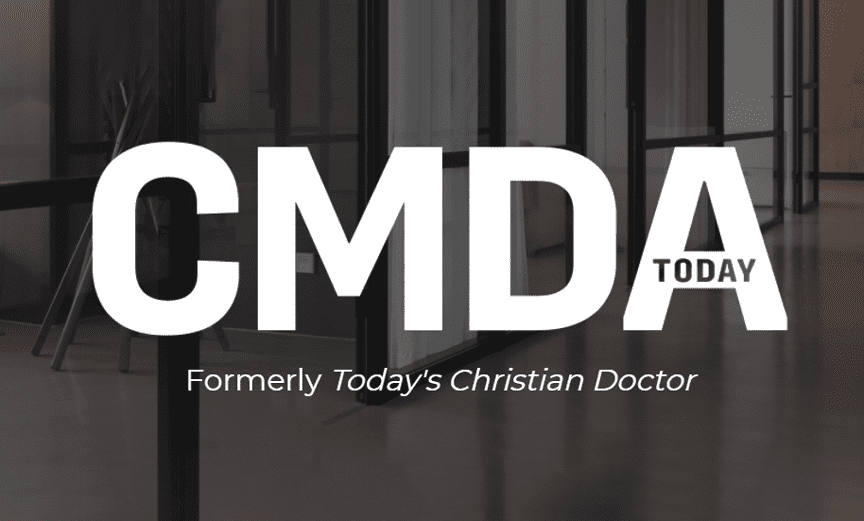
CMDA Ethics Statement: Disagreement Among Christians on Bioethical Issues
Throughout the history of the church, there have been times when Christians have disagreed with one another in the pursuit of truth. The causes for this are many. Human knowledge is limited, and sometimes sources of knowledge can be interpreted differently.

by Christian Medical & Dental Associations®
Throughout the history of the church, there have been times when Christians have disagreed with one another in the pursuit of truth. The causes for this are many. Human knowledge is limited, and sometimes sources of knowledge can be interpreted differently. Also, not all people prioritize values identically, nor do they all use the same method of moral reasoning. And, notably, our fallen nature may cloud, and even distort, our reasoning and judgment. Thus even among the most faithful and well-intentioned Christians disagreements may sometimes occur.
These disagreements can become especially acute in healthcare where lives and deeply personal decisions are at stake. Medical practice is complex, with novel biotechnologies emerging every year within societies whose cultural and moral pluralism creates conflicting attitudes toward the appropriate use of technologies, both new and old. Faithful Christians seeking to apply biblical principles to inform healthcare decisions may sometimes come to conflicting opinions on challenging bioethical issues. Because these differences can threaten the unity that God desires among His people, CMDA offers the following guidance for dealing with matters of disagreement.
Seeking Truth
Scripture testifies that God is love and that God’s Word is truth. Among the truths daily encountered in medicine are that our bodies are good (Genesis 1:26-31; John 1:14; 1 Corinthians 15:51-52) and fearfully and wonderfully made (Psalm 139:14), but also that sin has dire consequences (Romans 6:23). In answer to death and disease, followers of Christ are assured of the promises of everlasting life and of a future of restored health in a right relationship with God (John 3:36, 6:35; 1 Corinthians 15).
There are three levels of the certainty of truth that should be distinguished:
First, the essential and foundational truths of the Christian faith are true at all times and for all people (See, for example, the CMDA Statement of Faith).
Second, there are areas where knowledge is not, or is not yet, available. These include matters of nature, biology, medicine, history, cosmology, and eschatology that are either beyond our human capacity for understanding (Psalm 131:1), or not fully known or understood, and on which Christians may hold differing interpretations.
Third, there are moral dilemmas that are as yet unresolved or for which there may be more than one acceptable answer. These include matters of ethics, practice, and worship that are neither commanded nor prohibited by the Bible, and may legitimately be considered disputable (Romans 14:1-12).
Balancing Truth and Unity
Truth and unity are both fundamentally important. God desires and calls His people to live and work together in love and unity (Psalm 133:1; John 17:17-23; Romans 12:16; Ephesians 4:1-16; 1 Peter 3:8). Christians’ love for one another and for the world is a response and witness to God’s love shown through the goodness of His creation, through His acts in human history, and supremely through the redeeming grace of His Son, Jesus Christ. Christian unity is based on truth grounded in the authority of Scripture and fellowship in the Holy Spirit, and it witnesses to the gospel message of salvation through Christ. Christian healthcare professionals, by God’s grace, should act with love and seek unity (2 Corinthians 13:11-14).
Applications of these levels of certainty of truth are as follows:
Christian healthcare professionals are called to teach, uphold, and live in accordance with biblically-grounded moral courses of action. To be faithful to this calling and to live by truth, we must uphold without compromise the essential and foundational truths of the Christian faith as they apply to healthcare. When, for the sake of unity, Christians are inclined to compromise on essential and foundational truths (“agree to disagree”), such attempts at unity are false and illegitimate. In this exercise of moral relativism both truth and unity are ultimately lost.
No Bible verse should be considered in isolation, nor should its interpretation contradict other, more clearly interpreted biblical texts, but rather should be considered in the context of the whole counsel of Scripture. When interpreting passages that are difficult to understand or apply, interpreters should inquire of the Holy Spirit and resist being swayed from biblical instruction by personal feelings or the latest cultural trends. All biblical interpretation must be done with prayerful humility and diligent scholarship, seeking the counsel, wisdom, knowledge, and experience of those, contemporary and historical, who have devoted themselves to study and to living out the truths of the Bible within the body of Christ. When Christians maintain unity despite disagreements in areas where knowledge is not, or is not yet, available, such disagreements may be legitimate and demonstrate appropriate humility.
Christians may legitimately disagree on the morality of an action if the Bible is clearly silent in its prohibitions, mandates, examples, counsel, or overall narrative relevant to that action. Christians may also legitimately disagree when an agreed upon biblically derived principle leads to differing views on how that principle is to be applied, provided the resulting actions do not contradict God’s Word or other biblically derived foundational principles. When Christians disagree on disputable matters and yet maintain unity, they reflect the love of Christ, who is calling them to unity. Agreement is not always possible, yet love for fellow believers is always commanded. Decisions in these matters should be guided by love and wisdom in accordance with the purposes of God’s kingdom, the counsel of Scripture, and the guidance of the Holy Spirit through prayer and reflection (Philippians 1:9-11).
Communicating Truth
When it becomes necessary to explain or defend our ethical positions, Christian healthcare professionals should articulate biblically consistent arguments with boldness, clarity, and conviction, speaking against contradictory views that violate or oppose essential and foundational truths of Christ. In doing so, in faithfulness to the teachings of Christ, we express truth with words of grace and love. We should defend Christian positions with compassion, honesty, humility, integrity, charity, and kindness. In disagreement we must be patient with each other and, if one has a grievance against another, forgive (Ephesians 4:32). We should avoid quarrels and be “quick to hear, slow to speak” (James 1:9) – patiently listening, carefully reasoning, and speaking humbly and truthfully in love (Ephesians 4:2, 15) so that we do not discourage or harm our brothers and sisters in Christ (Romans 13:10). Our language should never condemn other Christians who, for whatever reasons, hold differing views on controversial or morally complex issues. In our disagreement we should model respectful dialogue and generosity, judging ideas but not judging people.
When there are legitimate disagreements among Christians in matters of medical ethics, we should respect fellow believers’ conscientious decisions. Disagreements should not be allowed to disturb our relationship in Christ. Rather, the process of dialogue is an opportunity to express our love for our neighbor and an opportunity for God to fashion us to become more like Christ.
May we thereby practice our profession in service and in true unity of the body of Christ as it witnesses to the gospel to the world.
Helpful Scripture References on Unity (not exhaustive) (English Standard Version)
Psalm 133:1
Behold, how good and pleasant it is when brothers dwell in unity.
Proverbs 18:19
A brother offended is more unyielding than a strong city, and quarreling is like the bars of a castle.
Matthew 10:16
Behold, I am sending you out as sheep in the midst of wolves, so be wise as serpents and innocent as doves.
Matthew 18:20
For where two or three are gathered in my name, there am I among them.
John 13:35
By this all people will know that you are my disciples, if you have love for one another.
John 17:23
I in them and you in me, that they may become perfectly one, so that the world may know that you sent me and loved them even as you loved me.
Romans 11:33
Oh, the depth of the riches and wisdom and knowledge of God! How unsearchable are his judgments and how inscrutable his ways!
Romans 12:4-5
For as in one body we have many members, and the members do not all have the same function, so we, though many, are one body in Christ, and individually members one of another.
Romans 14:1
As for the one who is weak in faith, welcome him, but not to quarrel over opinions.
Romans 14:19
So then let us pursue what makes for peace and for mutual upbuilding.
1 Corinthians 1:10
I appeal to you, brothers, by the name of our Lord Jesus Christ, that all of you agree, and that there be no divisions among you, but that you be united (as in knit together, thoroughly completed or repaired) in the same mind and the same judgment.
2 Corinthians 13:11
Finally, brothers, rejoice. Aim for restoration, comfort one another, agree with one another, live in peace; and the God of love and peace will be with you.
Ephesians 4:1-6
I therefore, a prisoner for the Lord, urge you to walk in a manner worthy of the calling to which you have been called, with all humility and gentleness, with patience, bearing with one another in love, eager to maintain the unity of the Spirit in the bond of peace. There is one body and one Spirit—just as you were called to the one hope that belongs to your call—one Lord, one faith, one baptism, one God and Father of all, who is over all and through all and in all.
Ephesians 4:11-16
And he gave the apostles, the prophets, the evangelists, the shepherds and teachers, to equip the saints for the work of ministry, for building up the body of Christ, until we all attain to the unity of the faith and of the knowledge of the Son of God, to mature manhood, to the measure of the stature of the fullness of Christ, so that we may no longer be children, tossed to and fro by the waves and carried about by every wind of doctrine, by human cunning, by craftiness in deceitful schemes. Rather, speaking the truth in love, we are to grow up in every way into him who is the head, into Christ, from whom the whole body, joined and held together by every joint with which it is equipped, when each part is working properly, makes the body grow so that it builds itself up in love.
Philippians 1:9-11
And it is my prayer that your love may abound more and more, with knowledge and all discernment, so that you may approve what is excellent, and so be pure and blameless for the day of Christ, filled with the fruit of righteousness that comes through Jesus Christ, to the glory and praise of God.
Philippians 2:2-3
. . . complete my joy by being of the same mind, having the same love, being in full accord and of one mind. Do nothing from selfish ambition or conceit, but in humility count others more significant than yourselves.
Colossians 3:12-17
Put on then, as God’s chosen ones, holy and beloved, compassionate hearts, kindness, humility, meekness, and patience, bearing with one another and, if one has a complaint against another, forgiving each other; as the Lord has forgiven you, so you also must forgive. And above all these put on love, which binds everything together in perfect harmony. And let the peace of Christ rule in your hearts, to which indeed you were called in one body. And be thankful. Let the word of Christ dwell in you richly, teaching and admonishing one another in all wisdom, singing psalms and hymns and spiritual songs, with thankfulness in your hearts to God. And whatever you do, in word or deed, do everything in the name of the Lord Jesus, giving thanks to God the Father through him.
2 Timothy 2:23-25
Don’t have anything to do with foolish and stupid arguments, because you know they produce quarrels. And the Lord’s servant must not be quarrelsome but must be kind to everyone, able to teach, not resentful. Opponents must be gently instructed, in the hope that God will grant them repentance leading them to a knowledge of the truth.
1 Peter 3:8
Finally, all of you, have unity of mind, sympathy, brotherly love, a tender heart, and a humble mind.
Approved by the House of Representatives
Passed with 50 approvals, 0 opposed, 0 abstention
April 27, 2023
Covington, Kentucky




